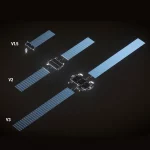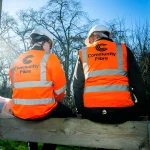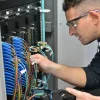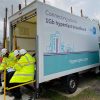BT Begin OpenRAN Trial in Hull UK to Boost Mobile Broadband

Mobile operator EE (BT) has today announced that they’ve joined with existing network supplier Nokia to conduct one of their first UK trials of Open Radio Access Network (OpenRAN) technology in the East Yorkshire City of Hull, which they hope will “enhance [the] mobile broadband experience” for locals.
At present, mobile operators that want to buy new network kit can often only pick from a few big suppliers (e.g. Nokia and Ericsson, since Huawei is no longer an option). The O-RAN approach seeks to standardise the design and functionality of such kit and software, thus increasing the number of companies able to supply them via vendor-neutral hardware and software-defined technology (the RAN side covers infrastructure, masts and antennae).
All of the UK’s major mobile operators are currently looking at O-RAN solutions for the future and have already agreed a “joint ambition” with the government, which will see 35% of the UK’s mobile network traffic being carried over O-RAN by 2030 (here). But so far Vodafone is the only operator to have committed to a solid large-scale commercial build (here).
Advertisement
Not to be outdone, BT (EE) has long said that they intend to conduct more O-RAN trials of their own (here), and their deployment in Hull is the first big step on that road. As part of this, EE will install Nokia’s RAN Intelligent Controller (RIC) for O-RAN across a number of sites, to optimise network performance for its customers.
In addition to this trial, BT will also open a dedicated O-RAN Innovation Centre at its Adastral Park facility later in 2022. This will provide opportunities for large and small vendors to develop and prove their equipment and provide a platform for open architecture progress across all network elements.
Neil McRae, BT’s Chief Architect, said:
“Our Open RAN trial with Nokia is one of many investments we are making to boost the performance of our market-leading 4G and 5G EE network and deliver an even better service to our customers. Our high performance, high efficiency radio access equipment, provided by the major global vendors, has enabled us to roll-out 4G and now 5G at scale, with the confidence that our customers will get the best network experience possible.”
Mark Atkinson, Nokia’s SVP of Radio Access Networks PLM, added:
“We are delighted to deepen our partnership with BT with this trial. Nokia is investing in Open RAN capabilities to enable a robust telecom ecosystem with strong network performance and security. An open and programmable RAN enables many new advanced capabilities to be introduced that can automatically optimize the 5G network. I look forward to seeing how this project develops.”
The move, while welcome, does appear to represent somewhat of a different approach from Vodafone. The latter has been trying to foster a new ecosystem of suppliers around ORAN, which has encouraged interest from Samsung, NEC and others into the UK mobile market. By comparison, BT has chosen to work with one of the already dominant suppliers (likely to be a smoother / safer ride, if perhaps not as bold or ambitious).
All of this should support EE’s goal of extending 5G to cover more than half the UK’s population by 2023 (years ahead of the current Government’s ambition for 2027). On top of that, they also aim to “deliver 5G connectivity solutions anywhere in the UK by 2028” (here) and to complete the country’s only fully converged network by the mid-2020s (although Virgin Media and O2 will no doubt follow.. eventually).
Advertisement
However, we should caveat that EE’s goal for 2028 (above) reflects the combined impact of both 5G reaching over 90% of the UK’s landmass and their plans for “on demand” connectivity solutions, but we still know very little about the cost, accessibility and practicality of those mooted “on demand” solutions. Until then, we’d recommend taking that “anywhere” coverage pledge with a pinch of salt.
Mark is a professional technology writer, IT consultant and computer engineer from Dorset (England), he also founded ISPreview in 1999 and enjoys analysing the latest telecoms and broadband developments. Find me on X (Twitter), Mastodon, Facebook, BlueSky, Threads.net and Linkedin.
« Tesco Mobile, Sky Mobile and GiffGaff Top for UK Customer Satisfaction






















































Interesting. Might need to grab an EE SIM again!
Not too sure how ‘interesting’ it is that BT/EE are basically taking the path of least resistance by just jumping straight back into bed with one of the major players. Clearly Nokia and Ericsson have a role to play in a more open and interoperable future, but isn’t the whole point of O-RAN to boost vendor diversification in a stagnant market? I don’t see how this trial really moves the needle any…
@Tony Dean
This is because Neil has previously stated they want to take a more cautious approach to O-Ran and that it would be about expanding capabilities rather than reduce cost. O-Ran with one of the major vendors for the 4/5G networks has been signposted for a while now.
https://www.telecomtv.com/content/open-ran/bt-s-chief-architect-skeptical-about-open-ran-s-cost-saving-potential-42932/
Probably a far cheaper way of getting BT broadband services into Hull than installing their own fibre I guess?
KC are obliged to wholesale FTTP in the same way that Openreach are. BT wouldn’t have to build to launch broadband in Hull.
Not enough customers in Hull to justify the expense of taking a wholesale service.
If this provides competition who cares how it’s done?
Covering half the population is the easy part, same as the FTTP numbers, reaching the kind of coverage they and we want If I understand it right demands the widespread deployment of 700mhz band equipment but thereby losing the data speed that 5G is mainly advertised and expected to bring by users.
It seems there will be lots of ‘well done us’ press releases and advertising from the operators regarding their coverage area but will it be this low latency high speed ‘5G’ we’ve been told was going to transform our lives over that old hat 4G.